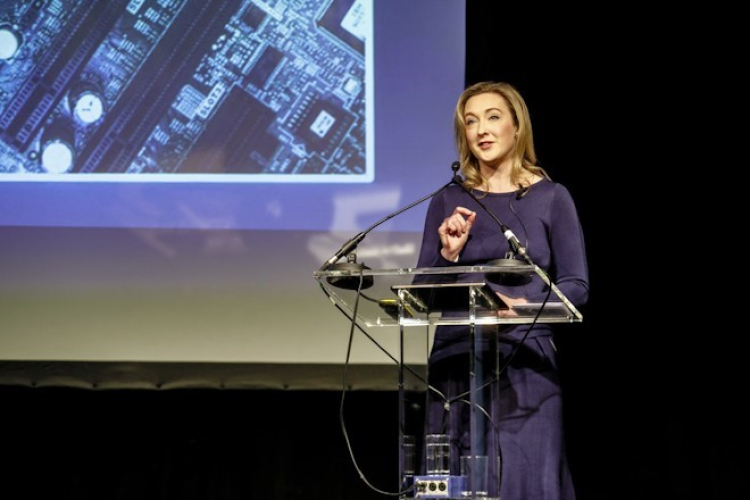ERM Forum: Uncertainty, volatility, what next? – Lloyd’s

Rebekah Clement, sustainability director, Lloyd’s, addressed the Airmic ERM Forum 2022.
“We’re living in challenging times,” acknowledged Rebekah Clement, sustainability director, Lloyd’s, in a keynote speech at Airmic’s recent Enterprise Risk Management (ERM) Forum.
The market’s first sustainability director, Clement traced the rise of myriad risks and existential threats facing organisations in 2023.
From the Ukraine War, stagflation, pandemic, energy crisis and climate emergency, each of these risks are interconnected and fuelling uncertainty, she emphasised, “making insurance more important than ever”.
For context, Clement showed a time-line spanning two centuries of global disruption caused by wars, financial disasters and health crises. “We’re in one of those disrupted periods today,” Clement told the event, held in London on 6 December.
An era of low inflation, low interest rates, low volatility, and slow but steady economic growth is over, she warned, with current volatility “outside modelled outcomes”.
“In the UK, movements in foreign exchange and bond yields triggered immediate financial impacts needing to be assessed. It became clear that these risks were outside many firms’ modelled outcomes to investments,” said Clement.
“The inherent unpredictability of these events makes them difficult to navigate,” she warned.
“It shows the importance of looking beyond model outputs to challenge the resilience of a business to these events. Stress testing and scenario analysis for increases in interest rates, market volatility and other events are absolutely essential,” Clement added.
Using the interactive app Slido, a straw poll of four areas of risk revealed that “economic developments” were top of mind among the audience of risk management professionals gathered for the ERM Forum, ahead of the other pressing demands, such as climate change, followed by cyber risks and geopolitics.
Clement underlined the six-fold price increase paid for natural gas in Europe since 2021 and the inherent challenges organisations face to balance immediate energy risks with climate goals for what remains a longer-term existential threat.
“This poses challenges to the world’s transition to Net Zero,” she said. “We need flexibility. We need to think about how to stick to those long-term goals and how we ensure that we are not giving up on the progress we’ve committed ourselves to.”
This means challenging conversations about transition risk between financial services and “heavy energy”, carbon-emitting industries, noted Clement, who had recently returned from the Cop-27 climate risk event held in Sharm el-Sheikh, Egypt.
Energy companies are going to be critical to the energy crisis as well as to the transition to a greener, low carbon economy, she emphasised.
Clement underlined several other challenges in the next few years, including the continued expansion of the cyber risk insurance market, necessary to transfer an increasing risk for insureds.
“There’s been a spike in cyber-attacks since the start of the Ukraine conflict mostly within the region, although Microsoft detected Russian-affiliated network intrusions against 42 countries outside of Ukraine since the start of the conflict,” Clement said.
Lloyd’s underwrites around a fifth of global cyber insurance, she explained, and she said the market believes the cyber market will treble in size between now and 2030.
Efforts among risk professionals should focus on building resilience, Clement stressed, with “basic cyber hygiene” dramatically reducing risk, she suggested.
This should be combined with renewed efforts towards horizon scanning to manage volatility, particularly the unpredictability of increased political and geopolitical risks, she noted.
Lloyd’s is committed to working with its partners for “a braver future”, she said.
“This includes being more sustainable by transitioning to a low-carbon planet, more resilient by using evidence and expertise to protect what matters most, and more inclusive by ensuring everyone can see a place for themselves in it,” Clement added.
